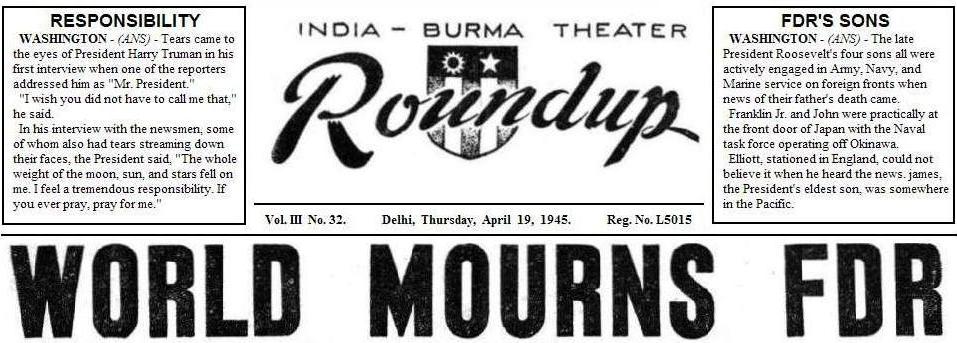
|
The body of Franklin Delano Roosevelt, 31st President of the United States, was lowered to its final resting place in the soil of his Hyde Park, N.Y., home this week as 140,000,000 Americans from Washington to New Delhi paid tribute to their leader.
The last rites at the White House and at Hyde park were of extreme simplicity to follow through to the end the Lincoln-esque democracy that has characterized the 12 year and 80 day duty of President Roosevelt as head of the Republic of the United States.
A special train brought the body from Warm Springs, Ga., where he died of cerebral hemorrhage last week, to Washington, D.C., thence on to his native State of New York. The President was buried Sunday morning in the sunlit garden of his ancestral home at Hyde Park.
Ceremonies in connection with the last rites for the President were observed wherever Americans were assembled, and in this global war, they were on every continent. But in Washington, where the physical body of the President was present, the greatest crowd in the history of the capital, estimated at 400,000, assembled for a last farewell as the body was brought from Union Station to the White House.
The services at the White House were majestic in their simplicity. The President's casket was lifted from the black military caisson on which it had been carried by a selected military guard. As it was carried into the White House the Marine Band played Lead, Kindly Light.
Walking with her son, Brig. Gen. Elliott Roosevelt, the only son able to arrive for the funeral, Mrs. Roosevelt followed the casket, a firm, tall figure in widow's black. Behind her were her daughter, Anna Boettiger and the latter's husband, Lt. Col. John Boettiger. Behind them walked the four Roosevelt daughters-in-law. President Harry Truman slipped away to allow the Roosevelts to enter alone with the President's casket.
Outside on the lawn thousands crowded to salute the Commander-in-Chief. There was no state funeral and the body did not lie in state in conformance with the wishes of Mrs. Roosevelt.
BURIAL RITES SIMPLE
Following the White House rites, the funeral party accompanied the body to Hyde Park, where the President was buried after simple rites performed by the local pastor. Only family members and high Government dignitaries were present.
Two physicians were by the President's side as death came. They were Dr. James Paullin and Cmdr. Bruenn of the navy. The attack came without warning.
The president had worked all morning and was posing for some sketches. Suddenly, he said, "I have a severe headache." They were his last words. He lapsed into unconsciousness. Two hours and 20 minutes later he was dead. The only ones present in his Warm Springs home were the White House pharmacist, Cmdr. George Fox, Secretary William D. Hassett and two cousins, Miss Laura Delano and Miss Margaret Suckley.
MRS. ROOSEVELT VISITING
One of the physicians called Washington and notified Adm. Ross McIntyre, personal physician to the President. He called Mrs. Roosevelt, who was at tea with Mrs. Woodrow Wilson, widow of the late President Wilson. Mrs. Roosevelt excused herself without saying anything about the death of her husband. Ten minutes later they heard the news.
Mrs. Roosevelt notified her sons of the death of their father. All were on fighting fronts. In her message, Mrs. Roosevelt said, "He did his job to the end. Bless you and all our love, Mother." One son, Lt. Cmdr. Franklin Jr., received the message aboard a ship in a task force off Okinawa that was repelling a Jap air attack.
NATION BEWILDERED BY PASSING
The entire U.S. was bewildered by the passing of the man who had familiarly addressed capitalist and laborer alike as "my friends" and whose friendly fireside chats had brought hope in the darkest days of economic strife and world war.
Newspapers came out with extras, radio stations cancelled all commercials, schools and stores were closed. One battalion, due to leave for overseas, marched in a body to a chapel and requested their chaplain for a special service in honor of the president.
Exhibition baseball games were cancelled, minutes of silence were observed nationwide. People were crying in the streets of cosmopolitan New York.
AMERICA MARCHES ON
The American people pondered and agreed over the words of Mrs. Eleanor Roosevelt, "I am more sorry for the people of this country than I am for us."
But the spirit that is America marches on. As a Marine told a reporter in New York, "God, we'll miss that guy. But we've survived before and we will this time. The things he stood for we can't forget and we won't. It will make this country more determined than ever."
MEMORIALS FOR FDR HELD IN I-B THEATER
|
Sultan Heads Bhamo Rites
Roundup Staff Article
The U.S. Army in the India-Burma Theater held services from Karachi to Burma Sunday in memory of its late Commander-in-Chief, Franklin D. Roosevelt, as installations all over the world joined in a tribute to their former Chief.
In New Delhi, capital of India, thousands of U.S. troops lined the streets and marched to Lady Hardings Field where open air services were held. Representatives of the British, Chinese and Indian Governments were present as Maj. Gen. Frank Merrill, Deputy I-B Commander, read the order from Secretary of War Henry L. Stimson formally announcing the death of Franklin D. Roosevelt to the U.S. Army.
SERVICE AT BHAMO
Meanwhile, far from New Delhi, Lt. Gen. Dan I. Sultan, Theater Commander, paid tribute with his troops in bombed-out Bhamo. There the Americans held services in a natural amphitheater in the heart of the town recently captured from the Japanese.
Ranking British and Chinese officers joined with the Americans in memorial to Roosevelt at Bhamo. The services were presided over by Col. W. F. Breidster, NCAC Chief of Staff, with Chaplain Roland Hudson reading the invocation.
The New Delhi service was opened by the band of the First Battalion of the famous Royal Inniskilling Fusiliers, with the hymn Abide With Me. Then the Deputy Theater Commander read General Order 28 from the War Department.
WAR DEPARTMENT ORDER
"The following order of the Honorable Henry L. Stimson, Secretary of War, announces to the Army the death of Franklin Delano Roosevelt, President of the United States: 'It is my duty as Secretary of War to announce to the Army the death of Franklin Delano Roosevelt, President of the United States, which occurred at Warm Springs, Ga., at 1635 hours, 12 April 1945. The Army is deeply grieved at the death of our Commander-in-Chief. He prepared us to meet the savage onslaught of our enemies and he led us through the bitterness of our early reversals. His unwavering courage in the face of overwhelming odds, his abiding faith in the final triumph of democratic ideals and his clear vision of the paths to be followed were a source of constant inspiration. He gave the Army unstinted of his strength and wisdom, and his unremitting labors hastened his death. Although he leaves us while there is still much hard fighting ahead, the ultimate victory has been fashioned of his heart and spirit. Memorial services shall be held on the day of the funeral, 15 April, at all posts, camps and stations. The former Vice-President of the United States Harry S. Truman has taken the oath of office and assumed the duty of President in accordance with the provisions of the Constitution.
"The National flag will be displayed at half staff at the headquarters of all military commands and vessels under the control of the War Department from 0800 hours, local time, 13 April, until sunset, 12 May 1945, West longitude dates, war operations permitting. The wearing of mourning bands, the draping of colors and standards and the firing of salutes will be dispensed with because of war conditions."
MEMORIAL PRAYER
Maj. George A. King, S.J., Catholic Chaplain for the theater, then read the memorial prayer.
"Almighty God, the Supreme Commander-in-Chief of all men and all nations, has called to Himself His faithful servant and our late Commander-in-Chief, Franklin Delano Roosevelt. The heart of the world is sad, numb with a personal grief. With victory drawing so rapidly near, we and the Allied nations must endure a very heavy loss.
"But courage is the virtue of the hour - courage on the fighting fronts, courage on the home front, courage in all things. Franklin Delano Roosevelt, President of the United States of America for the longest period in history, a man of national and world destiny, was a supremely great man. In him we blended the qualities of realism and idealism in happy proportion. He was a surpassingly great statesman, a man of the deepest sincerity, breadth of intellect, and far-reaching vision. But most of all - he was a man of courage, the virtue of the hour. During all the crises of the past 12 years, though not a man of good health, he continued serene, confident and capable and under his brilliant leadership we have taken giant strides to victory and world peace.
"I am the Resurrection and the Life; he who believes in Me, even if he die, he shall live and whosoever lives and believes in Me, shall never die. In private life and in his many public utterances, he did believe humbly in Almighty God. He had strong faith and he lived that faith fully, inspiringly, courageously. He now has gone on to give an account of his grand stewardship and commendation, 'Well done, good and faithful servant.'
"The consequences of his death cannot yet be fully foreseen, but, under God, the might of our Allied arms must and soon will secure victory and peace. How sad Franklin D. Roosevelt would be if he thought that his passing would make us confused, faint-hearted, and slow to prosecute victory. No - from the other side of the grave we see him smile so familiarly as he gives one final command.
"We, men and women of the United States of America, and of all the Allied nations shall never break faith with him, his ideals of freedom from fear and freedom from want. And so, for his grand heroic soul, a prayer, and to his memory, in benediction, and the gratitude of a world now at war but soon to be at peace.
"The death of a just man is like the end of a perfect day. May his inspiration and example lead a war-torn world to temporal peace; may his gallant soul rest with God in eternal peace."
Following the prayer and honor guard composed of former Merrill's Marauders fired three volleys and Taps was sounded, ending the ceremony.
|
FDR's Last Moments
NEW YORK - (ANS) - The Russian-born woman artist who was sketching President Roosevelt when he was stricken fatally at Warm Springs, Ga., this week painted for the nation a verbal picture of his last living moments.
At her Locust Valley, L.I., home to which she returned by automobile, Mme. Elizabeth Schoumatoff, tall dark-haired brown-eyed woman told newsmen that Roosevelt was seated at a fireplace in the little White House. With him also were his two cousins, Miss Laura Delano and Miss Margaret Suckley, and his secretary, William D. Hassett.
PRESIDENT BUSY
"The President was busily signing papers," she said. "There were papers stacked on the card table, chairs were covered with papers, as was a large sideboard. Hassett said, 'Don't mind me. I'm just drying my laundry.' The President burst into laughter at that."
She explained Hassett had been referring to the fact that the papers were spread around the room to allow the President's signature to dry.
"I had brought my easel with me for a life-size portrait," Mme. Schoumatoff continued, "I was getting set to start painting when I noticed the President had worn his red Harvard necktie. It was just right. He never looked better than when he greeted me. he had on a dark grey suit and the Harvard necktie was a perfect blend with his blue Navy cape."
BEGINS PAINTING
Mme. Schoumatoff said one of the cousins who had stepped out of the room then returned. Some conversation regarding the pose followed and she began painting.
"The time was 12:30. The butler came in towards 1 o'clock and started to set the table for luncheon. Hassett had taken his papers away. The President looked up from the papers he had been working so hard over and said to me, "We've got just about 15 minutes to work."
"With that he went back to work on the papers. He became so engrossed he slipped slightly out of pose. His head went down a little, but I didn't ask him to look up. He was extremely absorbed. Fifteen minutes had passed.
OUT OF POSE
"I couldn't paint his face while he was out of pose, so I was doing this and that, particularly making notes of color and light on his face.
"Then he raised his left hand to his left temple. Then to his forehead. His hand went back to the arm of his chair. Then slowly he lay back, reclined in the chair, slipped slightly to the left. Then the two cousins rushed to him just as the butler came into the room."
She explained that one of the cousins told her to ask the Secret Service man to call a doctor. "I went out and I did that immediately."
Mme. Schoumatoff said she did not again return to the room. About 15 minutes later the doctor arrived and then someone telephoned Mrs. Roosevelt.
HEARS OF DEATH
The artist then left. She said she had not known that the President was seriously ill and that she had not known he was dead until she had reached Macon, Ga.
She said she would work two more days to complete the unfinished portrait, and expressed the hope it would be hung in the Roosevelt Library at Hyde Park, N.Y.
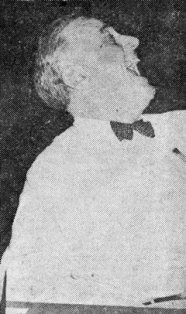 DEMOCRATIC - Franklin Delano Roosevelt was the personification of democracy. Here he is
shirt sleeved and laughing.
DEMOCRATIC - Franklin Delano Roosevelt was the personification of democracy. Here he is
shirt sleeved and laughing.
|
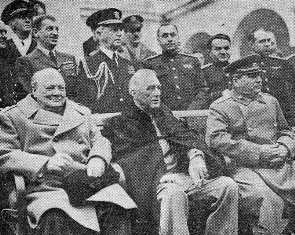 BIG THREE - The late President of the U.S. sits in the center at Yalta between Winston Churchill and Joseph
Stalin. Roosevelt, with Churchill and Stalin, formed the Triumvirate that made up the leading spirits of the
United Nations.
BIG THREE - The late President of the U.S. sits in the center at Yalta between Winston Churchill and Joseph
Stalin. Roosevelt, with Churchill and Stalin, formed the Triumvirate that made up the leading spirits of the
United Nations.
|
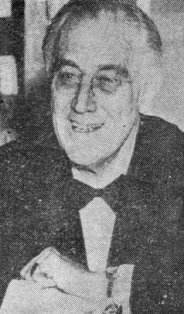 RADIO VOGUE - Opponents said that the golden charm of FDR's radio voice swayed an election.
RADIO VOGUE - Opponents said that the golden charm of FDR's radio voice swayed an election.
|
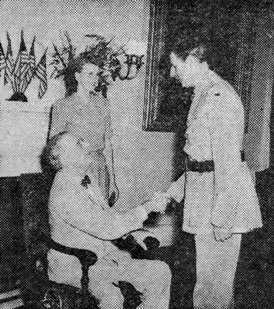 PERSONALITY - Here the noted Roosevelt magnetism is used to greet silent Charles de Gaulle on his visit to America.
PERSONALITY - Here the noted Roosevelt magnetism is used to greet silent Charles de Gaulle on his visit to America.
|
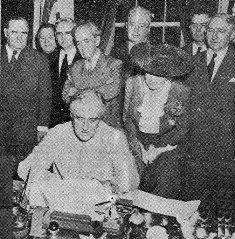 FRIEND OF SOLDIER - FDR was noted as a humanitarian. Here he signs the G.I. Bill of Rights into law. Roosevelt fixed Federal Service priority for the veteran and stated many times the welfare of the returning serviceman was his and America's prime consideration.
FRIEND OF SOLDIER - FDR was noted as a humanitarian. Here he signs the G.I. Bill of Rights into law. Roosevelt fixed Federal Service priority for the veteran and stated many times the welfare of the returning serviceman was his and America's prime consideration.
|
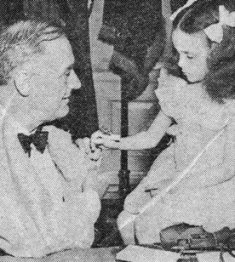 HUMAN - Roosevelt was warmly human and like all kindly men delights in the presence of children. Here he is with a visitor.
HUMAN - Roosevelt was warmly human and like all kindly men delights in the presence of children. Here he is with a visitor.
|
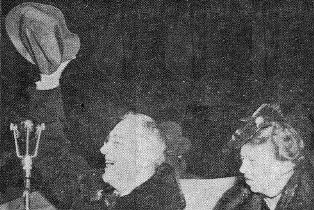 FAMILY - Roosevelt was a family man. Here he is shown with his wife, Eleanor, on a trip to say hello to neighbors near their Hyde park estate.
FAMILY - Roosevelt was a family man. Here he is shown with his wife, Eleanor, on a trip to say hello to neighbors near their Hyde park estate.
|
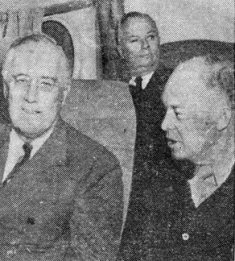 DANGER - Personal disregard of danger was an integral part of this leader. Here, in a plane to Sicily, he
talks to Gen. Ike Eisenhower.
DANGER - Personal disregard of danger was an integral part of this leader. Here, in a plane to Sicily, he
talks to Gen. Ike Eisenhower.
|
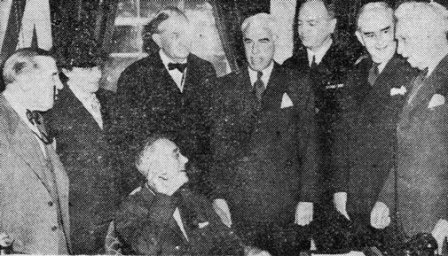 DIPLOMAT - Here Roosevelt is shown speaking with members of the delegation that will represent the U.S.
at the San Francisco Security Conference this month.
DIPLOMAT - Here Roosevelt is shown speaking with members of the delegation that will represent the U.S.
at the San Francisco Security Conference this month.
|
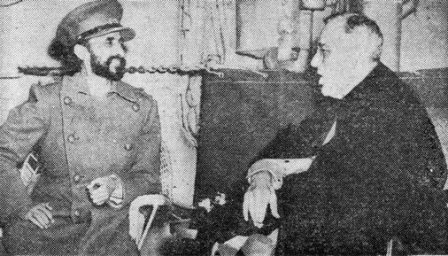 LIBERATOR - Franklin Roosevelt loved liberty and freedom. Here he talks with Emperor Hailie Selassie of Ethiopia, after the latter's country was freed of Fascism.
LIBERATOR - Franklin Roosevelt loved liberty and freedom. Here he talks with Emperor Hailie Selassie of Ethiopia, after the latter's country was freed of Fascism.
|
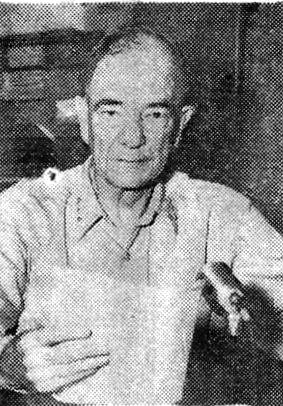
|
Roundup Staff Article
Lt. Gen. Dan I. Sultan this week was awarded the second Bronze Oak Leaf Cluster to the Distinguished Service Medal for his work as commander of the Allied force that cleared the Japanese from the land route to China and resulted in the opening of the Stilwell Road.
The award, made by the War Department at the direction of the President of the United States was presented by Lt. Gen. R. A. Wheeler, Deputy Supreme Commander, Southeast Asia, at a ceremony attended by high-ranking Allied officers.
The citation read as follows:
"For exceptionally meritorious and distinguished service in a position of great responsibility as Commanding General, Northern Combat Area Command, in Burma from 24 Oct. 1944 to 28 Jan. 1945.
"During this period Gen. Sultan exhibited outstanding ability, tact and initiative as Commanding General of an Allied command containing American, British, and Chinese units. The success of the operations directed by Gen. Sultan in Burma against great logistical and terrain difficulties, resulted in clearing the enemy from the land route to China, thus making possible the opening of the vital Stilwell Road."
Sultan won his DSM during World War I as a 32-year-old Lieutenant Colonel serving as a staff officer on the War Department General Staff and in France. He was awarded the first cluster for his work as commander of troops in the survey of the Inter-Ocean Canal route through Nicaragua from 1929 to 1931.
B-29 Photo Joes Help In Mapping Doug's Return
A XX BOMBER COMMAND SUPERFORTRESS BASE, INDIA - How a B-29 Superfortress of the XX Bomber Command photographed the coast of Luzon before Gen. Douglas MacArthur's invasion of that island in the Philippines has been disclosed in a citation for the entire crew.
3,200 MILES
The Distinguished Flying Cross has been awarded Capt. Peter Boyko, Rochester, N.Y., and Sgt. Edward George, Chicago. Ill., the two aerial photographers who crouched determinedly behind their cameras and shot pictures as the giant bomber circled Lingayen Gulf unescorted for almost an hour.
The reconnaissance mission, flown from a China base of the XX Bomber Command, covered 3,200 miles, most of which was over enemy territory. The citation stated, in part, "The excellent photographs brought back of enemy targets greatly aided and abetted the prosecution of the war."
Three enemy fighters were encountered high over the targets, but after performing various acrobatics, none elected to close on the Superfort and they streaked off without exchange of gun-fire.
DFC'S AND CLUSTERS
Pilot of the B-29 was Col. William P. Brett, Falls Church, Va., who was awarded the Oak Leaf Cluster to the Distinguished Flying Cross.
Other members of the crew who were also given the Oak Leaf Cluster to the DFC were: Maj. Arnold Wilson, LaSalle, Ill.; Lt. Edward Cass, Blue Springs, Neb.; Lt. Vernon Wilcox, Santa Monica, Calif.; S/Sgt. Stanley Ellis, Fullerton, Calif.; T/Sgt. William Jokela, Eureka, Calif.; M/Sgt. Felix Czerw, Avoca, Pa.; S/Sgt. James B. Cumming, New Rochelle, N.Y. and S/Sgt. John Desjardins, Dover, N.H.
 The crowns and crossed swords adorning the shoulders of a British officer meant nothing to a G.I. in
the Agra canteen the other day. As far as Sgt. Bill Cummings was concerned the "brass" was just another one of the
locals nosing around. So when the officer strode up, the American thought nothing of asking him to pull up a chair
and to join in a spot of tea.
The crowns and crossed swords adorning the shoulders of a British officer meant nothing to a G.I. in
the Agra canteen the other day. As far as Sgt. Bill Cummings was concerned the "brass" was just another one of the
locals nosing around. So when the officer strode up, the American thought nothing of asking him to pull up a chair
and to join in a spot of tea.
As the officer started to sit down, a pert young hostess said, "General, your car is ready."
After excusing himself and reminding Cummings they had a tea date for some time in the future, Gen. Sir Claude Auchenleck, Commander-in-Chief of the Indian Army, departed.
Cummings is still talking about it, reports Slipstream, Agra's weekly dispenser of base doings.
Muster day for the Aggies was started years ago when the faculty of the school at College Station, Texas, declined to give the students a holiday on Texas Independence Day. The students retaliated by giving themselves a holiday, and the alumni backed them up.
The three, Pfcs. Edward Hurd, Hillsboro, O., and John M. Hart, Spokane, Wash., of a signal service company, and Cpl. John N. Schmitt, Manhasset, N.Y., assigned to Theater Headquarters, first went as directed by the notice to the Delhi area Special Service office. Here they were told nai malum swimming tickets, but advised to try SOS.
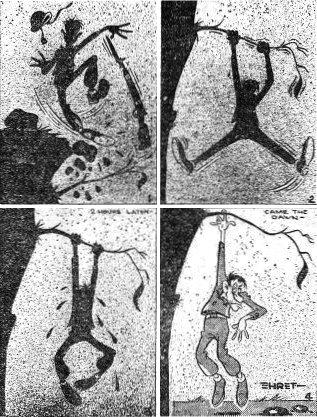
|
At the office of the British liaison officer, it was no deal again, but someone suggested trying Theater Headquarters. Baffled, the boys wandered into the Queensway Pentagon, made inquiries and were informed that the place they wanted was Canning Road headquarters.
"But we're from Canning Road," they protested. "Let's go," said Hart, "this is where I came in."
It seems that Joan had written a poem entitle The Army Goes to Tea for Yank, and although the verses went on to "rib" the brass for their take-off on the British customs in India, Stratemeyer liked the poem; hence the invitation. Here is The Army Goes to Tea:
I should like to see the captain," said the colonel to the WAC,
"I'm sorry, sir, he isn't here, but he will soon be back."
"But come, we're going on a flight; the plane, it leaves at three."
"I'm sorry, sir," the WAC replied, "the captain's out to tea."
The telephone it jingled, and the WAC with voice of cheer
Said, "Colonel Doodle's office, but the colonel isn't here."
"This is General Snipe," the answer came, "so tell me, where is he?"
"I'm sorry, sir," the WAC replied, "the colonel's gone to tea."
"I've got to get an order through," the irate major said.
"If we don't get some rations soon, my men will be all dead!
Please take me to Lt. Snoot, I know my poiint he'll see."
"I'm sorry, sir, Lt. Snoot has just stepped out to tea."
And so it goes across the world, wherever tea they serve,
This strange civilian custom that the officers observe.
But if you're just a poor G.I., you're frowned upon, you see,
If you should try, at four o'clock, to stop your work for tea!
THEATER SURGEON WARNS AGAINST CIVILIAN RESTAURANTS
The "in bounds" sign over the entrance to a restaurant isn't a fool proof guarantee of good food made under sanitary conditions, says Brig. Gen. James E. Baylis, India-Burma Theater Surgeon.
Despite rigid and frequent inspections by the Army, Baylis declared, it's just about impossible to watch these places continuously and bring them up to Army standards of cleanliness. The safest bet is to eat in Army messes whenever possible.
Baylis, a regular Army officer who has traveled throughout the Theater and recently received the Legion of Merit, discussed the problem of civilian restaurants at his New Delhi headquarters this week.
The healthiest months of the year for military personnel are February and March, he said. Disease rates are lowest then. With the warmer weather here and more coming, everything possible must be done to keep the expected increase down to a minimum. Drinking water and malaria control measures are relatively well known and have brought gratifying results. But what might be called food discipline isn't being observed as it should be, Baylis revealed.
The Army recognizes the value of food variety and change of atmosphere as a morale factor. In this part of the world, however, conditions in the civilian food handling industries are so utterly different from our own and food preparation methods so unchangeable for practical purposes because of centuries of habit and custom that it's pretty tough for even the Army to correct more than the most obvious evils.
To emphasize his point, General Baylis read from a report made some time ago after a thorough Army inspection of kitchens in eight popular restaurants in a large city. One kitchen was found to be reasonably clean. Of the others the report had this to say:
"Sanitary conditions in the kitchens of these representative restaurants are abominable. The filth, confusion and smells are so bad that it is unbelievable that the ordinary American would eat food served from such sources if he were aware of backstage conditions. It is unnecessary to enumerate specific sanitary defects in these places. Everything is bad, from inadequate refrigeration to dishwashing. Probably the only thing that prevents the decimation of American patrons is the fact that they must instinctively favor relatively safe hot dishes."
"That means," Baylis continued, "that we ought to stick to Army food. When we do eat in the "in bounds" civilian places we should still be wary about suspicious looking stuff, the drinking water, milk, ice cream, salads, mushy desserts, cold meats, puddings, and green vegetables."
The greatest caution should be exercised in the large cities and in restaurants where the clientele is both military and civilian. The Army's warnings to such places are obviously not heeded as carefully as those to restaurants in isolated areas, where military personnel constitute almost all the patrons and furnish most of the income, the general said.
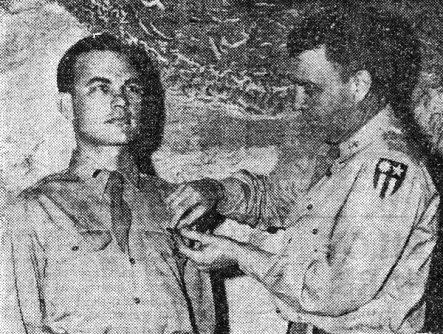 Maj. Gen. Vernon Evans, Chief of Staff of the India-Burma Theater, pins the Bronze Star on Lt. Paul Geren
for his work in the retreat from Burma in 1942. The award was presented at Theater Headquarters at New Delhi.
Maj. Gen. Vernon Evans, Chief of Staff of the India-Burma Theater, pins the Bronze Star on Lt. Paul Geren
for his work in the retreat from Burma in 1942. The award was presented at Theater Headquarters at New Delhi.
|
Recalls Stilwell Trek In Burma
By T/SGT. ARTHUR HEENAN Roundup Staff Writer
When Paul Geren came to the University of Rangoon as an economic professor in September, 1941, he didn't know that he was about to enter upon a novitiate of a second major: the history of World War II in the Orient.
But that just about describes the life and activities of the present Lt. Paul Geren. To carry the comparison to an extreme, he is even working in the Historical Section of the India-Burma Theater.
Geren's metamorphosis from mufti to khaki included serving with Lt. Col. Gordon Seagrave's Hospital unit from the Burma retreat to the triumphal recapture of Myitkyina. Now he is enjoying what our British cousins laughingly call "amenities" of civilization again.
TELLS OF AVG
Geren had been somewhat conditioned to rugged characters and lack of legitimate "Hahvad" accents by association with some of Dick Harlow's football importers of 1940 and 41. But he admits that even this contact with down-to-earth civilization hadn't prepared him for the AVG, members of which were aboard his ship bound for Rangoon.
"They were out for a fight, adventure, excitement, and a high return," reminisced Geren, who is a quiet, studious looking individual. "Every night was a party and the lightest form of relaxation among them was to throw a whiskey bottle in the air and then try to smash it with a beer bottle. I often thought of it afterwards when they were holding the skies over Burma against the Japs."
HELPS WOUNDED
Geren continued his duties at Rangoon University until Pearl Harbor. "But shortly after that we had to close up shop," he related. "All the students were called home by their parents because of the fear of air raids and on Dec. 23 the first one came. Over 2,000 civilians were killed and the first aid training I had been taking came in handy to help the wounded."
Geren told of the arrival of Dr. Gordon Seagrave from North Burma. Seagrave had six Lend-Lease trucks and needed volunteers to drive them. Geren volunteered and became a member of the Seagrave Hospital unit, attached to the Chinese. He told of how "Uncle Joe" Stilwell arrived in March and made the Seagrave assignment with the Chinese official.
REMAINS CIVILIAN
"Dr. Seagrave was soon sworn in as a major in the U.S. Army," Geren continued. "I had tried to join up in Rangoon. They took my name but said there was no one qualified to give a physical examination. So I remained a civilian.
"We were in about the same situation then the Japs are now. Our supplies and communications were
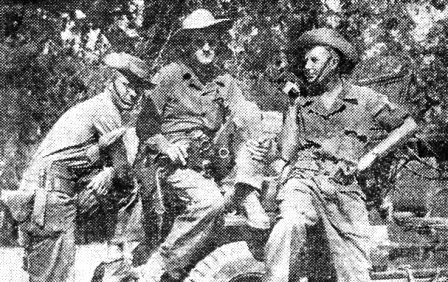 These three U.S. Cameramen have followed the British 14th Army through Burma recording the war against the Japs.
They have covered the fall of Mandalay and Meiktila. From left to right are Pfcs. Russell J. Scott,
Edwin Ahbe, and Martin G. Walz.
These three U.S. Cameramen have followed the British 14th Army through Burma recording the war against the Japs.
They have covered the fall of Mandalay and Meiktila. From left to right are Pfcs. Russell J. Scott,
Edwin Ahbe, and Martin G. Walz.
|
20-DAY RETREAT
"Finally we started our retreat from Burma at Shwebo on May 1, 1942. There were about 120 of us in the party headed by Gen. Stilwell. For the first six days we drove our trucks. We got as far as Mansa. Then we had to proceed on foot. We walked across the mountains and arrived at Imphal on May 20, 1942. That was where Gen. Stilwell swore to return to Burma.
"My outstanding memories are those of Gen. Stilwell on that retreat. He marched at the head of the column, setting the pace. Ofttimes in curling down a mountain, I'd look ahead and see the General with that slouch hat on his head and tommy gun over his shoulder. Every night he would clean his tommy gun.
ROGUE ELEPHANT
"I saw that tommy gun up close at one time. An elephant was standing near the path we were traveling. I called out, 'Hey, mate, how are things?' I suddenly found myself looking right into the eyes of Gen. Stilwell. He growled, 'You'll soon find out. That happens to be a rogue elephant.' The General had his tommy gun ready for action but luckily nothing happened."
Geren recalled their first food drop on the march by a British bomber. The food fell on a sandbar and the entire party, including Gen. Stilwell, clad only in shorts, waded the river and carried a sack apiece back to the bank.
AT IMPHAL
Upon arrival at Imphal after the retreat, Geren and the Seagrave unit were busy handling Indian evacuees. "It was pretty bad. They died so fast they couldn't bury them. The jackals would dig the bodies up at night."
Geren related how the Seagrave unit moved to Ramgarh, where Stilwell set up his Chinese training school. In May, 1942, Geren was put on civilian pay, getting Rs. 500 a month. In September he was offered a commission, but turned it down to got to Forman College in Lahore where he again took up teaching. Geren was suffering from a tropical fever and decided to get away from the jungle atmosphere and recover.
JOINS ARMY
In the Fall of 1943, cured of his illness, he came to Delhi and joined the Army. Immediately sent back to North Burma, he rejoined the Seagrave unit. He served with the Chinese 38th and 22nd Divisions in the opening of the campaign and then went on two missions with Merrill's Marauders.
In August, 1944, upon the fall of Myitkyina, Geren was sent back to Delhi, holding at that time the rank of corporal. He was assigned to the Historical Section and received his commission Jan. 23, 1945.
Just to forestall a flow of letters from the bushes about how he rates on rotation, we'll tell you now that only Army time counts.
|
CAA LICENSES
Dear Roundup: We have received several letters recently referring to a Roundup story on the granting of Civil Aeronautics Administration pilots' licenses. We do not know to what CAA license this refers. We are doing no pilot training at all since our War Training Services were completed. We are using as many veterans as we can get and training them for aircraft communicators and airway and airport traffic controllers, and to these workers, we give training courses, some of which are concluded in six weeks.
Please set the boys straight on this training business. - Ben Stern, CAA, Washington.
(The Roundup story in question came from the U.S. For details on CAA training write to the above.)
CREDIT NOT GIVEN
Dear Roundup: Reference is made to the article "Lands on Mountainside Strip in Night Rescue" (Roundup - April 12.) It may be of interest to the editor of such a worthy publication to know the discrepancies printed in the article.
The strip was not newly constructed but merely a field level and long enough for planes to land. Give the pilot credit due. (We did. - The Editor)
Four jeeps could not possibly light the field enough for even a Cub to land. It happens that approximately 30 vehicles were used to light the strip, including jeeps, trucks, weapons carriers and command cars.
Furthermore, Hensley was given first aid treatment in our dispensary and driven to the strip in our ambulance.
We are not asking for any personal praise on this feat, but it is apparent that credit has not been given to the men of our organization, who laid down their tools to help out in the emergency. Our company commander stopped a gravel haul to put trucks on the strip for illumination. - T/Sgt. Dan T. Innes, APO 218 (Bhamo and Myitkyina, Burma).
MORE A/B ENGINEERS
Dear Roundup: Apparently S/Sgt. Henry T. Appleyard has taken offense at a statement made by Sgt. Chris Winkler about the "Bewhiskered Veterans of Myitkyina."
Winkler was not referring to his outfit. He complained about a Roundup article publicizing an Aviation Engineering Battalion at Bhamo.
We who were at Myitkyina May 17, 1944 agree with Appleyard's statement about the condition of the airstrip. We of the A/B Engineers give and always have given the credit of the Myitkyina siege to the Combat Engineers of whom Applegate is obviously one. No one of the outfits of the original Myitkyina Task Force could have done without the other, and all of them should receive credit alike. - Pfc. G. Politick, APO 218.
Troop Carrier Wallahs Invent Tire Remover
HQS., 10TH AIR FORCE, BURMA - One of the meanest maintenance jobs connected with operating the C-47s of the 10th Air Force's Troop Carrier squadrons, Eastern Air Command, is the changing of a tire. A little different from the changing of an automobile tire, it usually takes anywhere from one to four hours of back-breaking work by airplane mechanics.
One day, following a terrific tussle with a reluctant tire, S/Sgt. Arnold L. Horner, Parker's Landing, Pa., and Sgt. Twyman T. Zanone, Louisville, Ky., maintenance wallahs with the Second Troop Carrier squadron, decided that something had to be done.
Disappearing for a couple of days the two non-coms dug around in the squadron engineering junk pile and came up with odds and ends of hydraulic equipment, a few pieces of scrap iron and some spare nuts and bolts. Then, they disappeared again.
When they again returned to the public eye the two had in tow a weird-looking piece of equipment. All mechanics within hailing distance were called over. Amid barbed taunts the two set about demonstrating their contraption - daintily named the "painless tire puller."
Much to the amazement of everyone, including both Horner and Zanone, the contraption worked perfectly. A frozen tire was removed from the rim of a transport plane wheel in the amazing time of 15 minutes.
This is Horner's second mechanical triumph to be recognized by the squadron engineering section. He was one of the charter designers of "The Tug," an all-purpose maintenance truck known the length and breadth of Assam for the variety of time saving jobs it can perform.
Veteran Of AVG Back At Lashio
HQ., 10TH AIR FORCE, BURMA - A Flying Tiger pilot, one of the last airmen to leave Lashio ahead of the Jap advance in early 1942, returned to open the new Lashio airstrip, soon after its capture by Chinese troops.
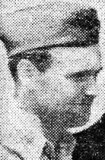
|
Maj. Stanley H. Wallace, Tulsa, Oklahoma, pilot with a 10th Air Force Combat Cargo Group, flew a transport into Lashio on the opening day of the new strip. Returned to the scene of his early exploits as a Flying Tiger of Maj. Gen. Claire Chennault's AVG, Major Wallace was congratulated by Major General Howard C. Davidson, commanding general of the Tenth Air Force, Eastern Air Command, who was aboard the plane on the maiden trip.
The return to the Lashio airstrip was the fulfillment of a three-year ambition of the former Flying Tiger. Wallace has watched 10th Air Force planes land at newly acquired airstrips in the wake of recent advances in Burma, determined that he would some day return to Lashio.
Fellow pilots jokingly compared Wallace to MacArthur and his famous "I shall return," but the major was not deterred. Within 72 hours after the Japs were driven from the airstrip, Wallace set the wheels of his combat cargo C-47 down on the red clay of Lashio airfield.
|
Bhamo Church
Rehabilitated
By U.S. Troops
BHAMO - Chaplains, officers and men of the many Protestant denominations in this area have forwarded a check for $1,100 to the Office of the Chief of Chaplains for transmission to the American Baptist Foreign Mission Society in New York City, asking that the money be used "for the further repair and beautification of the Roberts Memorial Baptist Church in Bhamo, Burma."
The church, built by Kachin Christians who completed it in December, 1941, and named it for Dr. William Roberts, first American missionary sent out to them, was used by the Japs as a stable for mules following enemy seizure of the city early in 1942. This failed to weaken the tribesman's belief in Christianity, so the building was cleaned up and converted into quarters for a Jap general.
As troops of Gen. Dan I. Sultan's Northern Combat Area Command neared Bhamo, the church was fortified as a strong point, and suffered considerable damage during the siege. Americans, Chinese and Burmans labored for a month after Bhamo was captured to remove the devils and restore the premises and building.
At the present time, seven religious service weekly are held in the rehabilitated chapel: Jewish services on Friday, Protestant services and Roman Catholic Masses during the week, two masses and two protestant worship services on Sunday.
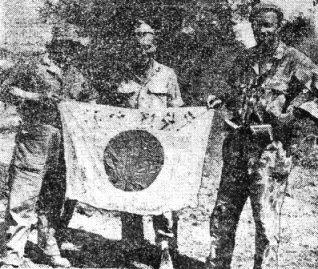 In the assault on Meiktila, Aviation Engineers of the India-Burma Air Service Command went in with a 14th
Army armored column to recondition the airstrip. In the process the souvenir lovers obtained a Jap regimental
flag. From left to right are Sgt. Walter J. Hybarger, Freeport, Ill., Lt. Robert R. Brakcell, Los Angeles,
and Sgt. Joe DeSalvo of Cincinnati.
In the assault on Meiktila, Aviation Engineers of the India-Burma Air Service Command went in with a 14th
Army armored column to recondition the airstrip. In the process the souvenir lovers obtained a Jap regimental
flag. From left to right are Sgt. Walter J. Hybarger, Freeport, Ill., Lt. Robert R. Brakcell, Los Angeles,
and Sgt. Joe DeSalvo of Cincinnati.
|
AIRCREWMAN BLASTS DUMP WITH PICTURE
BURMA - T/Sgt. Ray B. Lee, Bardwell, Ky., aerial photographer on a 12th Bombardment Group Mitchell, recently deprived the hard-pressed Japanese forces in Central Burma of one of their largest supply dumps.
"Every gunner in our plane was pumping .50 caliber shells into Japanese installations and motor transports," says Lee. "It made me feel like excess baggage. All I could shoot was my camera. Our B-25 was flying at tree-top level, and everything was going by so quickly I didn't even get a chance to take any pictures. Then I spotted what looked like oil cans off to the right. I didn't want to return to base with my camera full of unexposed film, so I pointed it at the oil cans and kept the shutter going."
Lee didn't know that he had photographed anything exceptional. Back at the base, he reported that he had "taken a few pictures."
But when the film had been developed and photo interpretation was complete, it was discovered that Lee had photographed an enormous supply dump. The surprised sergeant was called in by his commanding officer and congratulated.
The 12th's bombers and RAF fighter-bombers promptly blasted the supply area, and the effectiveness of the Jap opposition in the Meiktila area was considerably reduced.
ASSAM CONVOY ROUTE FEATURES
'THE BUMP' PRIOR TO 'THE HUMP'
Soldiers in the Assam portion of the India-Burma Theater have a phrase which is strictly local, "Before The Hump comes The Bump."
"The Hump," the phrase originated by airmen as descriptive of the flight across the mountains to China, is now well known to all the world. "The Bump" is not.
There are no four-lane highways in Assam. In fact, a one-lane convoy route is "velvet" in contrast to the stretches of unpaved road that must be navigated. Country roads back home might serve as a good example, if they are run down.
UP AND DOWN
The asphalt portions of this road give a constant up and down motion to the vehicles as they go forward. This is "The Bump," the long tedious supply route that helps link Calcutta to where "The Hump" starts, a vital link in the long chain of supply to the Burma and China fronts.
They have another local phrase on "The Bump." It is "Watch the Shamrocks go by." You can't miss the "Shamrocks" anywhere on the road. They are painted on the bumpers of so many vehicles that a newcomer invariably asks what it stands for, and the old-timer usually replies: "Oh, that! You'll get used to it. It's the insignia of a Quartermaster unit that covers the whole Assam Valley. You see, the Commanding Officer is Col. Ireland."
RAILS TO ROAD
You'll see the "Shamrocks" almost 500 miles from the airfields from which the supplies go over "The Hump," down where it's possible for the first time to transfer supplies from the over-taxed railways to the convoy road. You'll see them herding incoming vehicles on ferries to cross the Brahmaputra River, the broad stream that is sounded almost daily for shifting sand bars and where today's dock is not necessarily tomorrow's embarking point, for the river is like the road - it has its sharp ups and downs.
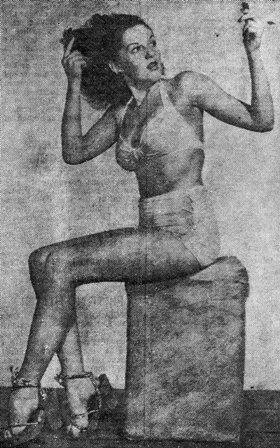 The British Morale Division was a trifle cynical about American cheesecake until someone saw a picture
of Brooklyn's Frances Vorne, christened by appreciative Yanks "The Shape." When they saw Frances, the British morale experts stopped sipping tea long enough to order some of her pictures for their lads. Above is a late picture of "The Shape."
The British Morale Division was a trifle cynical about American cheesecake until someone saw a picture
of Brooklyn's Frances Vorne, christened by appreciative Yanks "The Shape." When they saw Frances, the British morale experts stopped sipping tea long enough to order some of her pictures for their lads. Above is a late picture of "The Shape."
|
BIT SURPRISED
They've been going up and down "The Bump" for almost two years, these "Shamrock" kids, doing the job that has to be done even if little gets into the war news about it.
They're a bit surprised when you tell them that they are doing a tremendous job and making possible the fighting up front. Many are entitled to wear combat stars, but they never brag about it, nor do they think they were in much danger when the Japs, in early 1944, had them almost cut off.
4,000,000 MILES
Cold figures leave out too often a great part of the story. They have driven approximately 4,000,000 miles (not counting the up and down mileage) on the convoy route every six months, enough for 166 round trips to the U.S. half the world away.
In a period of seven months they averaged more than 1,000 vehicles a month up the long back-breaking route. No injury to personnel was suffered during this period, nor has there been any fatal motor vehicle accidents in the entire Group since its activation in 1943.
THE CONTRAST
But even the monotonous convoy route is romantic in comparison to the other major functions of the hard-working Group. Until recently one battalion shuttled supplies in short hauls from supply depots right onto the planes going to China. The Presidential Citation was awarded them for outstanding work.
Even that was more exciting than the work of still another battalion which specialized in unloading railway cars, classifying supplies, and getting them to the right warehouse. The battalion was commended for its long maintained standard of no loaded freight cars left on railway sidings for more than 24 hours, a record which has been kept for many months despite the heavy rail traffic.
500,000 TONS
This battalion has rolled up a mileage of about 5,000,000 miles in short hops that that almost resemble city traffic and have hauled more than 500,000 tons of supplies. A single driver has been known to haul over 30 tons in a single morning.
The requirements of war have caused many changes in the Group. It has sent some companies to China, some for a period in which they were still part of the Group and they have continued to turn in fine records.
One company that was part of the Group until a short time ago, was first to cover the Stilwell Road into China on the regular run. The men of the Group take great pride in the recent picture on Yank's cover in which a former Group sergeant was shown as the first American convoy driver to enter China.
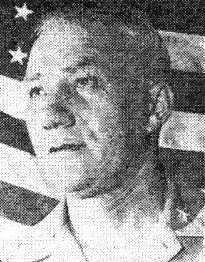
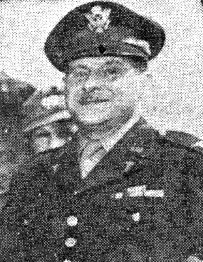 It is now Maj. Gen. Lewis A Pick and Brig. Gen. Isador Ravdin. Their promotions were confirmed by the
Senate this week.
It is now Maj. Gen. Lewis A Pick and Brig. Gen. Isador Ravdin. Their promotions were confirmed by the
Senate this week.
|
Hospital Head New I-B General;
Second Star To Ledo Road Chief
The Senate has confirmed promotions of Brig. Gen. Lewis A. Pick, builder of the Ledo Road, to major general, and of Col. Isador Ravdin, commanding the 20th General Hospital, to brigadier general, it was announced this week by Maj. Gen. W. E. R. Covell, head of SOS in the India-Burma Theater.
The second star for Pick is a direct result of his construction of the Ledo supply line to China. Pick took over the Road on Oct. 16, 1943, when forward construction had been stalled for almost a month.
AHEAD OF SCHEDULE
He went up forward with his subordinates. Gen. Joseph W. Stilwell told Pick the Road must be through to Shingbwiyang by Jan. 1, 1944. On Dec. 27, 1943, the lead bulldozer broke through to the target.
Pick and his men were right on the heels of the combat advance in North Burma. To typify the entire construction problem, the first convoy to China waited within sound of gunfire clearing the Road.
Pick was born at Brookneal, Va., Nov. 18, 1890. He attended Virginia Polytechnic Institute and graduated with the degree of Civil Engineering. He attended Engineer School at Ft. Belvoir, the Command and General Staff School at Ft. Leavenworth. He also was two years at the Army War College in Washington.
MISSOURI RIVER CONTROL
His Army career started as a second lieutenant in May, 1917. He served with the First Army in the Meuse-Argonne offensive. After the war he served in various posts for the Army, culminating in the post of Division Engineer of the Missouri River Division from March, 1942 to Sept., 1943. He devised the "Pick Plan" for the Missouri River. The plan covers flood control, navigation, hydro-electric power, and irrigation. It was recently approved by Congress and it is expected that work will start soon after the war.
Pick now controls the trucking over the Road from Ledo to Kunming. He is also responsible for keeping the Road open during the monsoon.
PHILADELPHIA SURGEON
Ravdin is a noted Philadelphia surgeon in civilian life. He was Professor of Surgery before the war at the University of Pennsylvania. Right after Pearl Harbor he was flown to Hawaii and was credited with saving countless American lives.
A graduate of Indiana University in 1916 and the University of Pennsylvania Medical School in 1918, the 50-year-old general is in command of one of the U.S. Army's largest General Hospitals. His unit has been responsible for the care of a large percentage of the Chinese and American battle casualties during the North Burma campaign.
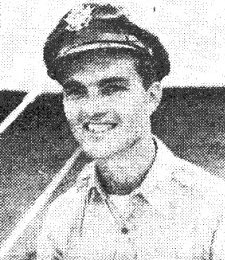
|
Lt. Edmund D. MacKay, Cypress, Calif., B-25 pilot with the 490th Medium Bombardment Squadron of the Tenth Air Force, Eastern Air Command, recently destroyed his sixth bridge in Burma, equaling the all-time individual high for the squadron, famed as the "Burma Bridge Busters."
The bridges credited to MacKay by the Tenth Air Force are the Hsipaw rail bridge, the Bodegon rail bridge, the Tangen rail by-pass bridge, the Nampawng road bridge, the Nampawng west by-pass bridge and the Namsang suspension bridge. All of these spans were important links in the Jap communications system in Burma.
MacKay's squadron has shattered almost 200 bridges and this destruction has played an important part in the Japanese retreat in Burma.
Before entering the Armed Services in 1942, MacKay was employed by the Douglas Aircraft Corporation at Long Beach, Calif.
Holder of the Air Medal and the Distinguished Flying Cross, MacKay has flown 46 combat missions, totaling 179 combat flying hours.
Any I-B Troops May Volunteer For China Drive
The chance to volunteer to drive the new Stilwell Road from Ledo to Kunming is not limited to SOS troops, it was announced by Col. Allen C. Bigelow, Chief of Motor Transportation Section, Transportation Services, SOS. All troops in the Theater who wish to volunteer will be welcomed, according to Bigelow, and it will be up to their own units to decide whether or not they can be spared to make the trip.
Since responsibility for the operation of the Road belongs to Maj. Gen. Lewis Picks' Advance Section 3, SOS, Bigelow says that names of men who wish to volunteer for the drive to China can be submitted by their organizations directly to Pick's headquarters, without reference to SOS in Delhi. SOS units will still submit their lists to Delhi.
He cautioned that men allowed to make the trip will be absent from their organizations for approximately 20 days and wants this fact made clear to units allowing their men to volunteer.
According to Col. Charles S. Davis, who has the direct responsibility for operation of the trucking route under Pick, they can use plenty of drivers. He makes no guarantee of how soon the men will be called after their names are submitted, but indicates that all who volunteer and are qualified will eventually be used.
So if you are in an AAF or a Theater unit, have it cleared in proper channels within your own outfit, and then your names will be submitted to Pick's headquarters.
'HAND ACROSS SEA' FROM YANK GIRL FOR RAF OFFICER
HQS., 10TH AIR FORCE, BURMA - The symbolic hands across the waters became a 15,000 mile reality for an American girl in Reading, Mass. and Squadron Leader William B. Paige, Royal Air Force, assigned to 10th Air Force headquarters in Burma.
From virtually out of the blue sky, Paige received a package of American food from a Miss Eleanor Brown, Reading, mass. Having never heard of the girl, although the RAF officer has been to America, he wrote a note of thanks and thought nothing more of it.
A V-mail soon came back in which Miss Brown stated "how I hate to spoil all the mystery. I received your name from one of the Hearst newspapers in Boston. I work at the Boston Navy Yard as a coppersmith, have been there for two years. We are kept pretty busy, work nine hours a day, six days a week."
It is believed here now that Miss Brown came across S/Ldr. Paige's name in a dispatch written by Jim Brown, International News Service war correspondent.
ROUNDUP PINUPPERS GET U.S. PUBLICITY
NEW YORK - (UP) - Latest communiqu from the Toni Seven pinup front this week was the widespread Stateside play given the story when a United Press feature writer, impressed by the volume of
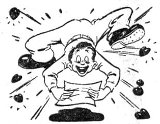
|
Requests for pictures of Toni, who recently defied the effort of those seeking to do away with G.I. pinup photos, by promising one of herself to any Serviceman asking for it, have reached a total of more than 250 letters, containing twice that number of requests. Roundup precipitated the flood when it referred prospective Toni Seven fans to Berrigan, ex-UP correspondent in India-Burma, now on the press service's India desk in New York.
A few of the statements in the letters: "You sure are the girl I would like to be stranded with"; "I would like to receive a photo of you that would make me jump straight up in the air if that ain't too much trouble"; "Every airplane in my squadron has a beautiful girl painted on it. I think our morale would go to hell if somebody made us paint them out"; and "Those guys in England were lucky to have a wall to put your picture on."
EAC P-51'S HIT ENEMY FIELD IN THAILAND
HQS., EASTERN AIR COMMAND - For the second time in a month, far-ranging Air Commando Mustangs of the Combat Cargo Task Force this week made the 1560-mile round trip to Don Muang airfield in Thailand, where they strafed Jap aircraft caught on the ground, destroying a total of 19, with six more probable and five damaged.
The bag included two planes burned at Nakorn Pathom field, west of Bangkok.
EAC bombers concentrated their efforts on enemy supply bases, as RAF Liberators and USAAF B-24's, with P-51 escort, battered stores dumps at Rangoon, near Moulmein airfield and at Prome.
B-25's caused large fires and explosions in attacks at Thayetkon, Kyaukpadaung and other supply targets in the area southeast of Thazi. Hurricanes bombed Jap installations near the port of Taingup and at Chauk; Spitfires strafed a base near Allanmyo; and P-47's ranged 30 miles southwest of Rangoon to pound warehouses at Dedaye.
Successful sorties were flown as usual against railroad bridges on the Burma-Siam and Mandalay-Rangoon lines by heavy and medium bombers, while fighters furnished strafing support to ground troops in the Arakan and Meiktila areas.
Sea-sweeping RAF Liberators from Ceylon sank a 350-ton vessel near the Nicobars, left a sub chaser sinking, and strafed a landing craft in the Mergui archipelago, forcing Jap infantry to jump overboard.
FDR DEATH SHOCK, SAYS GEN. SULTAN
Lt. Gen. Dan I. Sultan, Commanding General of the India-Burma Theater, broadcast the following message to his troops upon the death of President Franklin D. Roosevelt:
"The unexpected death of President Roosevelt, our Commander-in-Chief, has been a great shock to all of us. We must renew our determination to do our utmost to win the war quickly, in accordance with his plans and wishes, and in commemoration of his unsurpassed leadership during the past 12 years."
MARAUDERS PAY TRIBUTE TO PRESIDENT
Roundup Staff Article
Among the countless messages of sympathy and condolence sent to Mrs. Eleanor Roosevelt on the death of the President was the following letter, written by former members of Merrill's Marauders, who formed an honor guard at memorial services held in New Delhi this week.
This letter, a sincere tribute to their late Commander-in-Chief, is reprinted here in full:
"We men who served under the command of Maj. Gen. Frank Merrill in the North Burma campaign have just served as honor guards at the Army memorial service for the President here.
"It is hard to find the right words. We know that you will miss him, but we also know how much we will miss him. Over here we have met and served side by side with soldiers of China, India and Burma. We have met the wild Naga headmen and the Kachin fighters. The name Roosevelt was known to them even in the heart of the jungle.
"Ofttimes we would see newsreels in the jungle. Most of the newsreels showed the President. We practically had to explain everything in the reels to our Kachin and Chinese allies, but whenever the picture of the President came on the screen there would always come "ding how" from the Chinese and tribesmen would nod their heads.
"Because of the respect these people had for our Commander-in-Chief we had a great respect in ourselves. To the American soldier he was a friend. Generals are above the ordinary rank, but when we thought of the President he seemed to us just like another G.I. in the way he talked and the way he acted. We received the Presidential Citation and we know it came from a man who was a great soldier himself.
"Again may we express our sympathy and the hope and belief that our country can and will carry on in the way President Roosevelt would have wished."
The letter was signed by the following Marauders: Pfcs. Joseph C. Brown, Trenton, N.J.; Ben Bailey, Sterling, Ill.; Herman B. Sims, Gatesville, Tex.; Clarence Stearns, Oswayo, Pa.; Joseph J. Morley, Brooklyn, N.Y.; Joseph J. Nigro, Kelayes, Pa.; Harold Zelott, Proctor, Minn.; Herbert D. Gardner, San Antonio, Tex.; Leo A. Cucinotta, Boston, Mass.; Pvts. Alfred E. Hall, Jersey City, N.J.; Frank A. Gerzen, Chicago, Ill., and Verner Nielsen, Denver, Colo.
Franklin D. Roosevelt
(An Editorial)
This week we have told the story of the passing of President Franklin Delano Roosevelt with the saddest heart with which we have ever told a story.
With his passing goes the greatest friend the average American ever had in all the Nation's history. Born to moderate wealth, the President understood the common man and his problems better than the common man himself. Our President fought the average citizen's battles as well as he fought this most savage war.
His unquenchable spirit still lives to see the final victory in war just as his mortal self viewed his many victories in peace for the American people.
No man in history ever better blended the realism and the idealism of human affairs.
His memory shall forever be enshrined in American hearts.
A Chinese Tribute
By PAUL FENG China Central News War Correspondent
A year or so ago in the ancient city of Chengtu, a few G.I.'s and I, sipping tea in a restaurant indulged in a political bull session. We talked about the great and near great men of the world. We mentioned in the course of our conversation the name of Roosevelt.
The waiter had just come in with his brass pot of k'aisui (boiling water). "Loo Sie Fook," he said, apparently eavesdropping. "Loo Sie Fook, t'ing h'ao." He was beaming with smiles.
The waiter's spontaneous enthusiasm about the name Roosevelt reminded me of a little trip I took through the very heart of China. I had come to Free China from occupied territory shortly after Pearl Harbor, literally running away from the Japs. I and my little party got to a small village whose name God knows what. I would never had been there had it not been for the war. There were just a few isolated houses in the village.
We knocked at one door and were admitted. We crossed a small courtyard into what appeared to be the reception room, which is also the sitting room and the room where the family shrine is installed. But there was no family shrine. In its place were two portraits, one of Generalissimo Chiang Kai-shek, the other of President Roosevelt.
The waiter's kibitzing also brought me back to the time when I served as judge in a public speaking contest in Shanghai, just before Pearl Harbor. The city already was surrounded by Japs. Chinese troops nearly two years ago had withdrawn from that area. But because it had been a so-called "International Settlement," we still enjoyed a sort of non-belligerent immunity.
The theme the youngsters were to speak on was "Leaders of Foreign Lands." We listened to a number of speeches, all made in English, on Stalin, Chamberlain, Roosevelt and so on. The youngster who spoke on Roosevelt - or "Loosewelt" as she had it, unable to pronounce the "R" and "V" - won the contest.
This little speech was as simple as the speaker was - a tiny 14-year-old girl with two black pigtails. Her diction wasn't the best, but she clearly brought home the points she wanted to make.
"Loosewelt," she said, "is a leader of men. He serves as president of a great nation, the United States of America. But more than that, he also serves the world. He is a great man, like Washington and Lincoln."
Finally, she told her small audience: "You know why we in Chinese call him 'Loo Sie Fook?' . . . Whoever gave him that name is a genius. That name literally means 'Loo (a very common Chinese family name), the dispenser of a full life.' For that precisely is what he is."
An English Tribute
By BRIGADIER DESMOND YOUNG, M.C.
Director of Public Relations, India Command
What can an Englishman say about President Roosevelt? To write of him in conventional obituary terms seems futile, for he was no lay figure. Yet how can anyone but an American presume to assess or even to praise a man who was as essentially American as Nelson was English?
A few weeks ago I was staying in a house in Kentucky where the mention of his name was the height of unwisdom if one wished to remain a welcome guest. Because I have stayed in houses in South Africa where it was equally dangerous to mention the name of General Smuts. I was not surprised as another Englishman might have been. Domestic politics engender heat and I am old enough to recall the days when Mr. Lloyd George was unmentionable in many English homes.
In spite of all my efforts, I found myself involved in an argument with my host. I told him then, what was the simple truth, that I have never heard an Englishman, soldier or civilian, rich or poor, speak of President Roosevelt except with admiration, respect and even affection.
True, we know what we owe to him and to the American people. But there was more to it than that. There was something about the President which caught the imagination of Englishmen, just as there is something about Mr. Churchill which appeals to Americans. It was not merely that he was a great orator with a glorious voice. As a nation, we are pretty well proof against spellbinders. Nor was it that he had a pleasant fancy and a nice turn of wit and phrase, though that helps with us. Nor was it the magnitude of his achievements and his obvious qualities of leadership.
We recognized him, as the world must surely recognize him for centuries to come, as a great leader and a great statesman, gallant, tenacious and indomitable. But, knowing him only from the press, the radio and the films, we also liked him as a man, because we felt instinctively that he was a good man, with the good of the world at heart.
It will be a lasting regret to all Englishmen that we shall not see him driving through the streets of London to celebrate the final victory, amid the cheers of an English crowd. London would have liked to say "Well done and thank you."
World Leaders Express Solace In Messages
Roundup Staff Article
World leaders flooded Washington with messages of sympathy for the U.S. and Mrs. Roosevelt upon news of the death of President Roosevelt.
His great friend Winston Churchill, Prime Minister of Great Britain, asked the House of Commons for a five minute adjournment out of respect to the American leader. He said the death of the President was a "loss to the British nation and to freedom in every land."
FROM CHURCHILL
To Mrs. Roosevelt, Churchill sent the following message: "I have lost a dear and cherished friendship forged in the fire of war. You may find consolation in the glory of his name and the magnitude of his work."
From Marshal Josef Stalin, head of the Soviet Union, came the following: "The Soviet people highly valued President Roosevelt as a great organizer of the struggles of freedom loving nations against the common enemy and as a leader in the cause of ensuring the security of the whole world."
Chiang Kai-shek, head of the Chinese Government, was described as "stunned and greatly saddened" at the news. Chiang hailed the President as one of the great leaders of democracy and a true friend of the Chinese people.
JAP PREMIER QUOTED
Leaders of all the United Nations and neutral countries sent word of their feeling of personal loss in the death of FDR. Military and political leaders of the U.S. all joined in the condolences, the theme being that America had suffered a great loss.
Perhaps the greatest tribute came from the Premier of Japan. Adm. Suzuki told Domei, "I must admit President Roosevelt's leadership has been very effective and has been responsible for the American's advantageous position today."
The Roundup is a weekly newspaper of the United States Forces, published by and for the men in Burma and India, from news and pictures supplied by staff members, soldier correspondents, United Press, OWI. and Army News Service. The Roundup is published Thursday of each week and is printed by The Statesman in New Delhi and Calcutta, India. Editorial matter should be sent directly to Capt. Floyd Walter, Hq., U.S.F., I.B.T., New Delhi, India, and should arrive not later than Sunday in order to be included in that week's issue. Pictures must arrive by Saturday and must be negatives or enlargements. Stories should contain full name and organization of sender. Complaints about circulation should be sent directly to Lt. S. R. Rose, Hq., U.S.F., I.B.T., New Delhi, India. Units on the mailing list should make notification of any major change in personnel strength or any change of APO.

APRIL 19, 1945
Original issue of India-Burma Theater Roundup shared by CBI veteran Roger Cook
Copyright © 2008 Carl Warren Weidenburner
SEE THE ORIGINAL PAGE ONE
TOP OF PAGE PRINT THIS PAGE ABOUT THIS PAGE SEND COMMENTS
PREVIOUS ISSUE CLOSE THIS WINDOW NEXT ISSUE
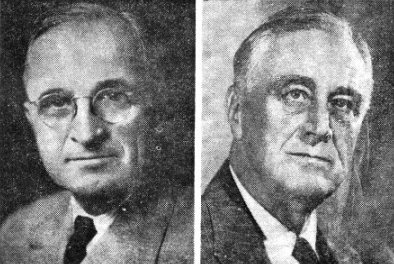 President Harry S. Truman (left) takes up the duties of the late President Franklin Delano Roosevelt (right).
It is his job to finish the greatest war in history and begin an era of peace. These pictures are the official
campaign pictures used when the fourth-term campaign was underway last year.
President Harry S. Truman (left) takes up the duties of the late President Franklin Delano Roosevelt (right).
It is his job to finish the greatest war in history and begin an era of peace. These pictures are the official
campaign pictures used when the fourth-term campaign was underway last year.
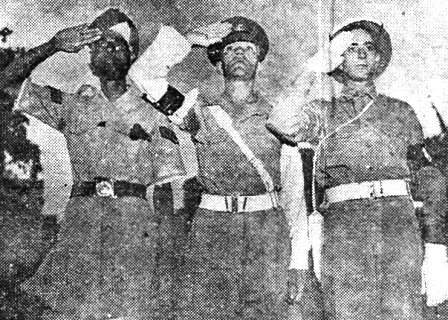 Typical of the tribute of people all over the world to the late President Roosevelt in this picture made
at the memorial services for FDR at New Delhi, Sunday morning. Left to right: Naik (Cpl.) Allab Dad Khan,
New Delhi police force; Cpl. R. B. Thomas, CMP(I), British MP; and Pfc. J. C. Harris, Lorrin, Miss., American
military policeman.
Typical of the tribute of people all over the world to the late President Roosevelt in this picture made
at the memorial services for FDR at New Delhi, Sunday morning. Left to right: Naik (Cpl.) Allab Dad Khan,
New Delhi police force; Cpl. R. B. Thomas, CMP(I), British MP; and Pfc. J. C. Harris, Lorrin, Miss., American
military policeman.
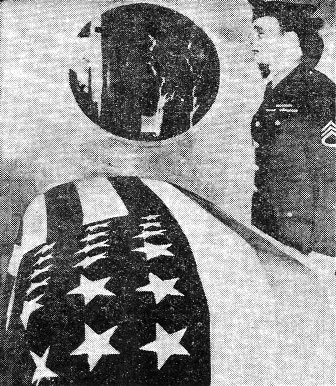 A sergeant of the U.S. Army forms part of a guard of honor inside the special train which carried the body
of the late President Franklin D. Roosevelt from Warm Springs, Ga., to Washington.
A sergeant of the U.S. Army forms part of a guard of honor inside the special train which carried the body
of the late President Franklin D. Roosevelt from Warm Springs, Ga., to Washington.

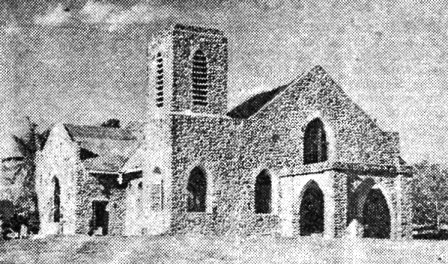 Church at Bhamo, Burma, which is the recipient of $1,100 from officers and enlisted men in the Bhamo area.
Church at Bhamo, Burma, which is the recipient of $1,100 from officers and enlisted men in the Bhamo area.